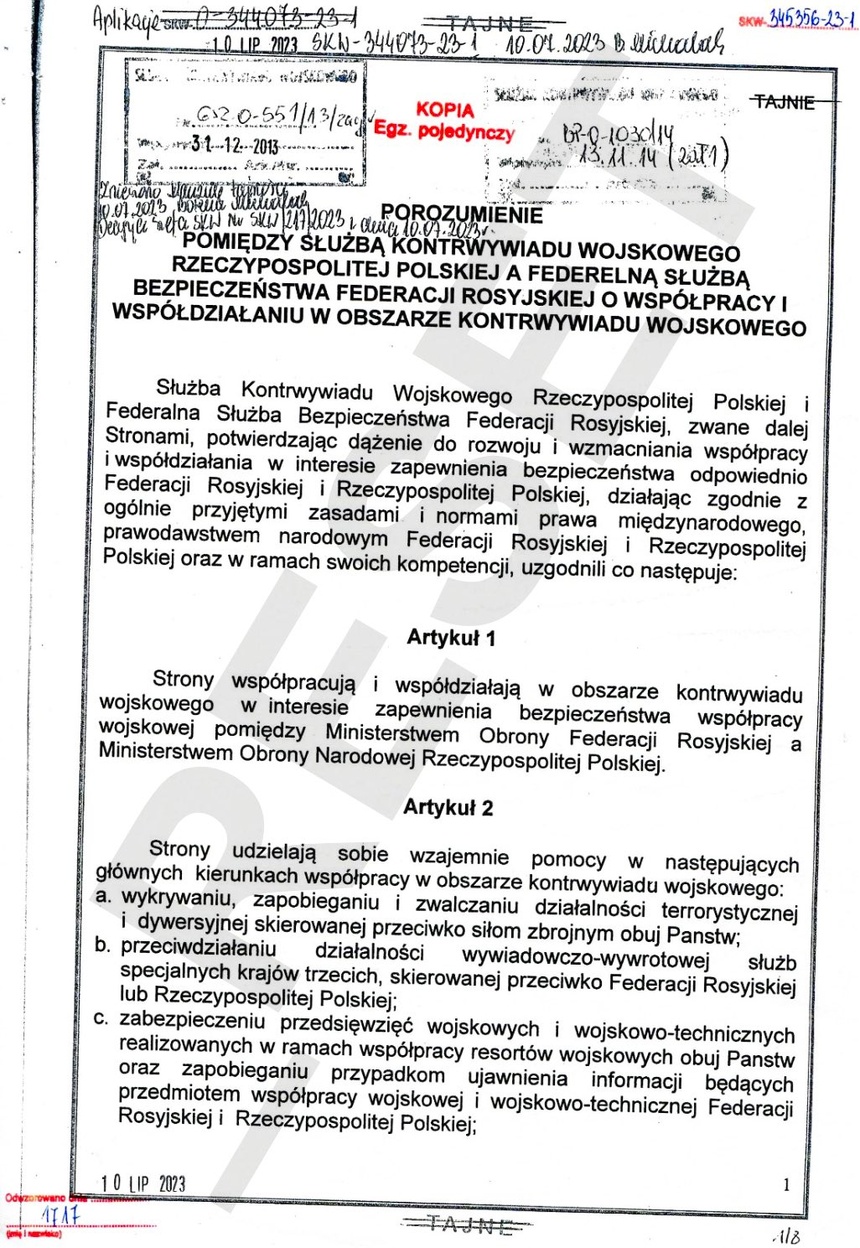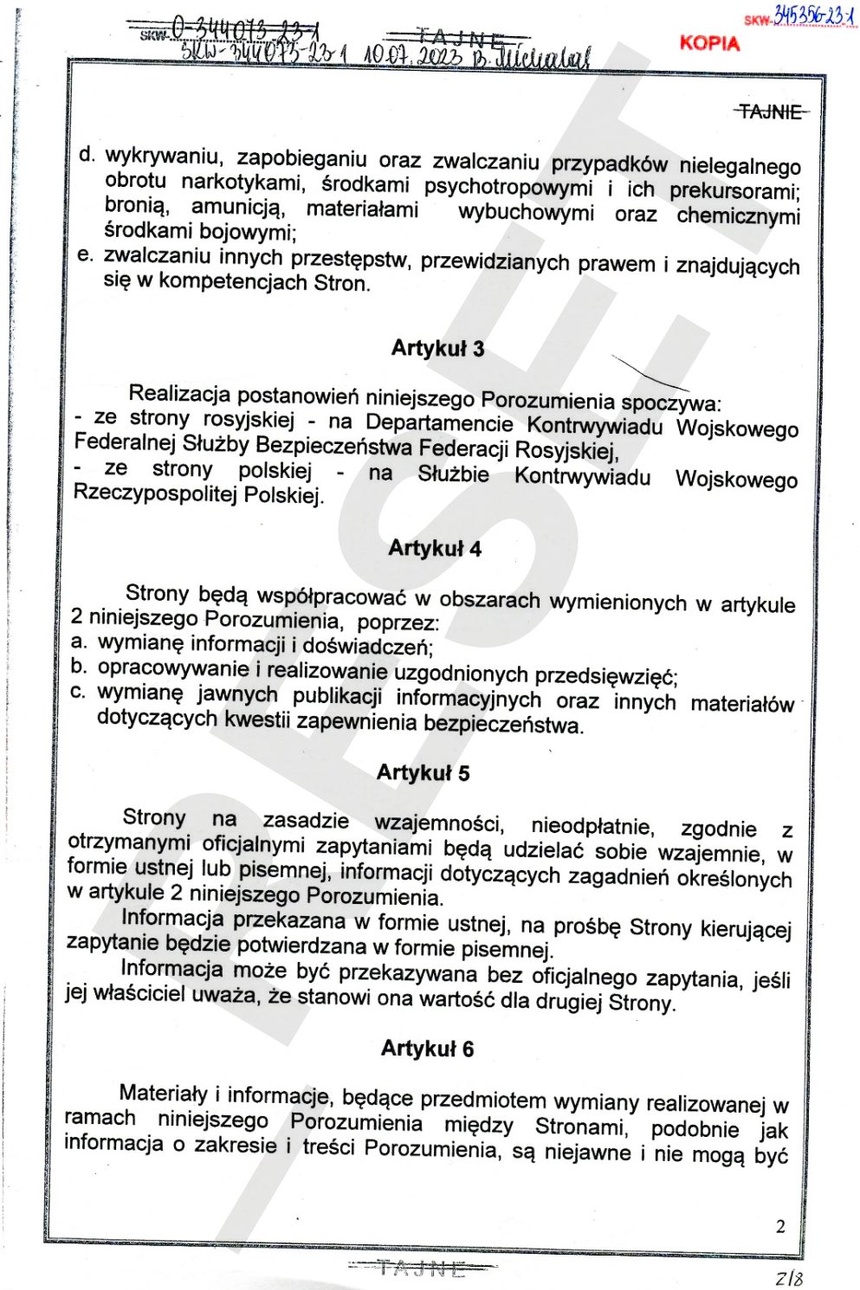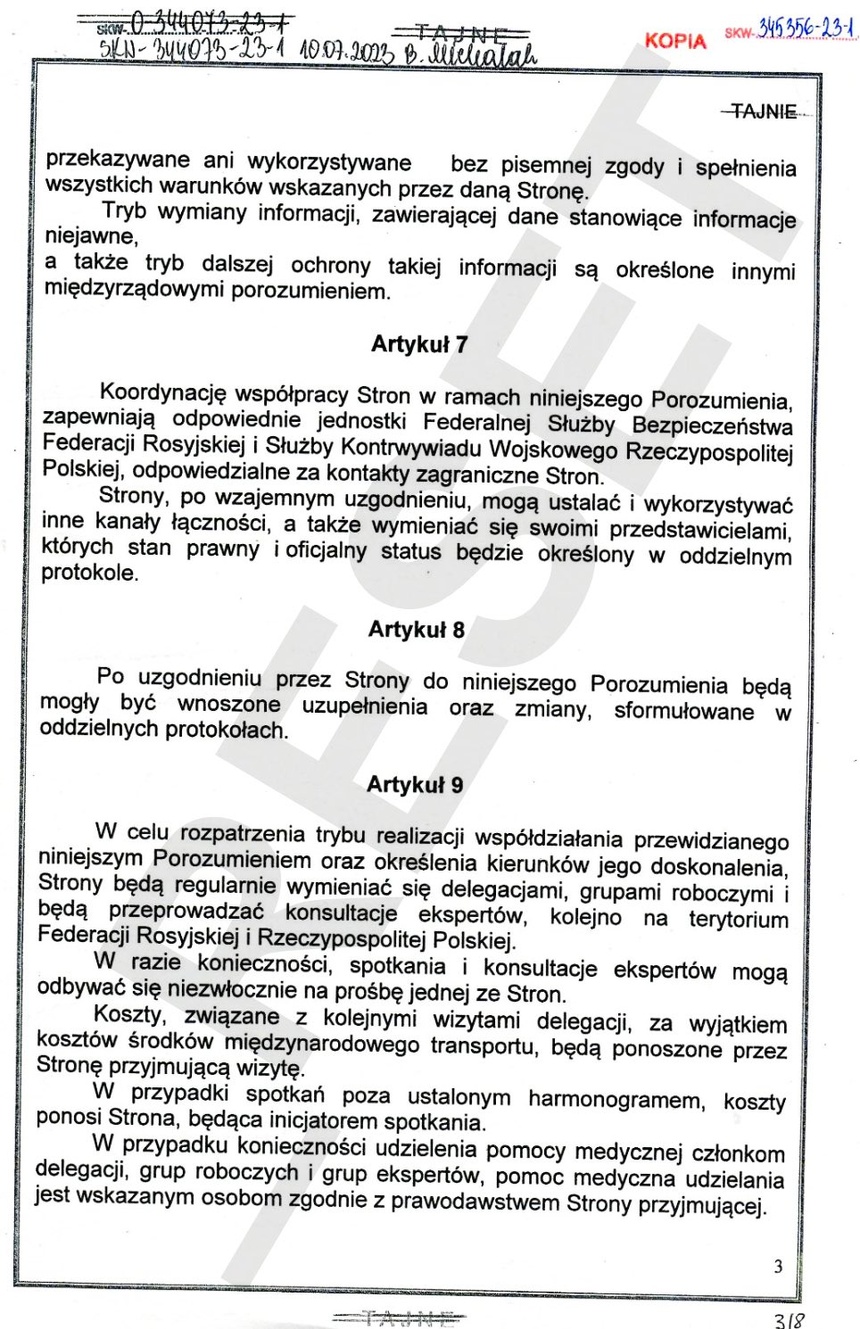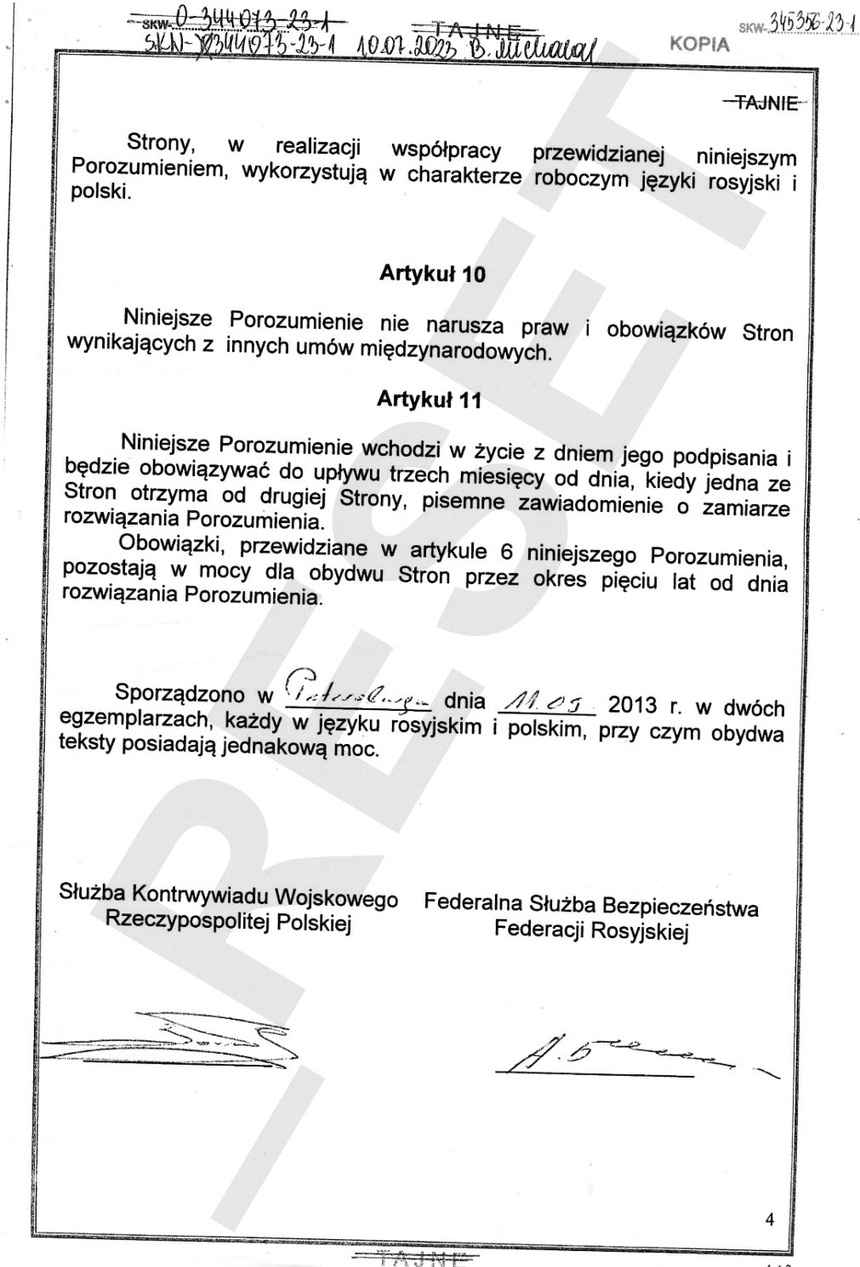511
BLOG
Sprawa Szatkowskiego: Umowa z 11 września 2013 nadal obowiązuje?
BLOG
Publiczna destrukcja reputacji amb. Tomasza Szatkowskiego przez premiera Donalda Tuska na podstawie informacji neo-SKW (2023–), każe zadać pytanie:
czy umowa SKW/FSB podpisana w Petersburgu 11 września 2013 r. za zgodą premiera Donalda Tuska nadal obowiązuje? Umowa nie została rozwiązana w trybie przewidzianym przez jej art.11, ani nie została w żaden sposób publicznie zdezawuowana przez premiera Tuska, MON ani samą SKW.
Donald Tusk, który jako premier zgodził się na zawarcie tej umowy, jest ponownie premierem. Wiceszefem SKW jest płk Krzysztof Dusza, jeden z negocjatorów umowy. Szefem SKW jest były oficer WSI. Umowę SKW/FSB zawarto w tajemnicy przed sojusznikami i cywilnymi specagencjami Polski.
Teza propagandowa, że o zastrzeżeniach z 2019 roku wobec amb. Szatkowskiego wiedziała (przeklęta, pisoska, dudowska, kaczystowska etc. etc.) paleo-SKW (2015-2023), tylko z powodów politycznych te zastrzeżenia ukryła i trzymała w ukryciu, a wydobyła je na światło dzienne dopiero dzielna neo-SKW, nie trzyma się kupy.
W zgodzie z brzytwą Ockhama, bardziej racjonalnym, a mniej sensacyjnym wytłumaczeniem byłoby, że paleo-SKW zarzuty pod adresem amb. Szatkowskiego zgodnie ze swoimi obowiązkami rozpatrzyła i uznała je za bezzasadne.
Brak akcji przeciwko amb. Szatkowskiemu ze strony służb NATO jest symptomatyczny. Może nie było i nie ma powodu do takiej reakcji? Kwatera główna NATO działa z oczywistych względów pod profesjonalną ochroną kontrwywiadowczą sojuszu.
Jeżeli NATO nie miało zastrzeżeń do Szatkowskiego, który przepracował tam 5 lat, a nawet rozważano poważnie jego powołanie na poważne stanowisko w sojuszu, to jako kandydat na takie stanowisko był sprawdzany przez kontrwywiad NATO wzdłuż, w poprzek i po przekątnej, zanim się w ogóle zaczęto przymierzać do takiej możliwości.
Bardziej skłonny jestem sądzić (znowu Ockham), że zastrzeżeń nie było, niż że NATO było naiwne i ślepe, zaś neo-SKW nadludzko spostrzegawcza.
Oskarżenie o "kontakty z zagranicznymi służbami specjalnymi" należy moim zdaniem traktować ze szczyptą soli i daleko posuniętą ostrożnością. Wątpię, by chodziło tu o Rosjan. Premier nie odmówiłby sobie przyjemności ogłoszenia tego z sejmowej trybuny. Uważam, że neo-SKW prawdopodobnie ma do amb. Szatkowskiego pretensje o nadmierną bliskość do sojuszników amerykańskich i brytyjskich.
Być może ambasador Szatkowski ma lepszą pamięć historyczną i świadomość patriotyczną niż neo-SKW, więc wie, że Amerykanie nigdy nie wywieźli żadnych Polaków na Alaskę, nie rozstrzelali cichcem żadnych Polaków w lesie pod Waszyngtonem, ani nie stłumili krwawo żadnych polskich powstań narodowych.
Każdy dyplomata pracujący tam, gdzie pracował amb. Szatkowski, z samej natury swojego stanowiska oraz charakteru instytucji w której pracuje, styka się z oficerami zachodnich służb specjalnych, tak zadeklarowanymi jak i działającymi pod przykryciem, w normalnym toku wykonywania swoich obowiązków.
Tak samo zresztą jak np. każdy polski attache wojskowy w placówkach na Zachodzie, będący niemal zawsze kadrowym oficerem SWW lub oficerem oddelegowanym do SWW, o czym obecny szef SKW powinien wiedzieć z pierwszej ręki, jako b.attache wojskowy w Ambasadzie RP w Waszyngtonie (2013-2016).
Zresztą niech mówią dokumenty:





PS.
Dla czytelników instytucjonalnych:
AGREEMENT BETWEEN THE MILITARY COUNTERINTELLIGENCE SERVICE OF THE REPUBLIC OF POLAND AND THE FEDERAL SECURITY SERVICE OF THE RUSSIAN FEDERATION ON COOPERATION AND COLLABORATION IN THE MATTERS OF MILITARY COUNTERINTELIGENCE.
The Military Counterintelligence Service of the Republic of Poland and the Federal Security Service of the Russian Federation, hereinafter called the Parties, confirming their pursuit of development and reinforcement of cooperation and collaboration in the interest of security of the Russian Federation and the Republic of Poland, acting in accordance with the generally accepted principles and norms of the international law, and the national laws of the Russian Federation and the Republic of Poland, have agreed as follows:
Section 1
The Parties shall cooperate and collaborate in the matters of military counterintelligence, in the interest of security of the military cooperation between the Ministry of National Defence of the Russian Federation and the Ministry of National Defence of the Republic of Poland.
Section 2
The Parties shall assist each other in the following main areas of cooperation in the matters of military counterintelligence:
a. detection, prevention and combatting of terrorism nd sabotage activities directed against the armed forces of both States;
b. counteracting intelligence and subversion activities of the secret services of third countries directed against the Russian Federation or the Republic of Poland;
c. provision of security to military and military-technical activities conducted as a part of cooperation between military Ministries and Departments of both States;
d. detection, prevention and combatting of illicit trade in narcotics, psychotropic drugs and their precursors, arms, ammunition, explosives and chemical warfare agents.
e. combatting of other crimes, as provided for by the law and falling within competencies of the Parties.
Section 3
Responsibility for implementation of this Agreement lies with, on the Russian side, the Military Counterintelligence Department of the Federal Security Service of the Russian Federation, and, on the Polish side, the Military Counterintelligence Service of the Republic of Poland.
Section 4
The Parties shall cooperate in the areas listed in
the Section 2 above, by means of:
a. sharing of information and experiences;
b. design and implementation of mutually agreed actions;
c. exchange of unclassified information publications and other materials relevant to the provision of security.
Section 5
The Parties shall provide to each other, at no charge and on the basis of received official enquiries, verbal and written information relevant to the areas specified in the Section 2 above.
Information conveyed in verbal form will be confirmed in writing on request from the Party making the enquiry.
Information can be conveyed without lodgment of an official enquiry if the originating Party believes the information to be of value to the other Party.
Section 6
Information and materials exchanged within the terms of this Agreement, as well as information concerning the content and scope of this Agreement, are security classified and cannot be onforwarded or exploited without a consent in writing from, and meeting of conditions set by, the relevant Party.
The mode of information interchange for information with classified content, and further protection of such information, are regulated by other inter-Governmental agreements.
Section 7
Cooperation between the Parties within the terms of this Agreement is coordinated by relevant units of the Federal Security Service of the Russian Federation and the Military Counterintelligence Service of the Repulic of Poland, responsible for international liaison of the Parties.
The parties, subject to mutual agreement, may establish and use other channels of communication, and may exchange representatives, whose legal and official status will be defined in a separate protocol.
Section 8
Subject to agreement between the Parties, this Agreement may be added to or amended; additions and amendments will be recorded in separate protocols.
Section 9
For the purpose of giving consideration to the mode of implementation of collaboration provided for by this Agreement, the Parties will conduct regular exchanges of delegations and working groups as well as hold consultative meetings of experts, alternately on the territory of the Russian Federation and the Republic of Poland.
If necessary, meetings and consultative meeting of experts can be arranged with immediate effect, upon request by either Party.
Costs of scheduled delegation visits, excepting costs of international transportation, will be borne by the receiving Party.
In the event of meetings outside the agreed schedule, costs will be borne by the Party intitiating a meeting.
In the event of medical help being required for any members of delegations, working groups and expert teams, such help shall be provided as specified in the laws of the receiving Party.
In the implementation of cooperation provided for by this Agreement, the Parties shall use Russian and Polish as the working languages.
Section 10
This Agreement does not infringe upon the rights and obligations of the Parties pursuant to other international agreements.
Section 11
This Agreement comes into force at the date of signing and shall remain in force for three months from the date of receipt by either party of written notice of intent to terminate the Agreement issued by the other Party.
Obligations listed in the Section 6 above continue for five years from the date of termination of the Agreement.
Prepared at Petersburg, on 11.09.2013 in two copies, each in the Russian and Polish languages, both copies having the equal legal power.
Signed:
for the Military Counterinteligence Service
of the Republic of Poland
Janusz Nosek
for the Federal Security Service
of the Russian Federation
Aleksandr Georgievich Bezverkhnyi
(Александр Георгиевич Безверхний)
Inne tematy w dziale Polityka

